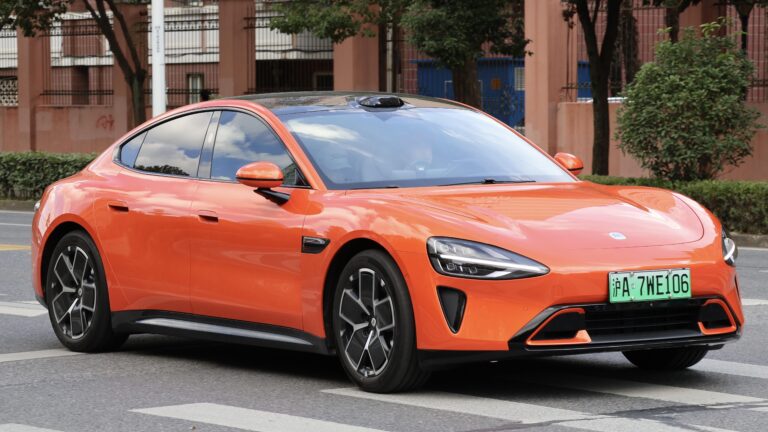Chinese tech giant Xiaomi is reportedly planning to expand its electric vehicle (EV) sales beyond domestic borders starting in 2027, according to statements from the company’s CEO. As the smartphone and consumer electronics manufacturer increasingly pivots towards the automotive sector, this move marks a significant step in Xiaomi’s ambitions to establish a global footprint in the competitive EV market. The announcement, first reported by Reuters, signals Xiaomi’s intent to challenge established players by leveraging its strong brand presence and technological expertise outside China within the next few years.
Xiaomi Eyes Global Expansion in Automotive Market with Plans Beyond China
Xiaomi’s aggressive push into the automotive market is set to extend beyond its domestic borders, with the company aiming to begin sales of its electric vehicles internationally starting in 2027. The announcement came directly from CEO Lei Jun, highlighting the tech giant’s confidence in its ability to compete on a global scale after establishing a strong foothold within China’s rapidly growing EV sector. This strategic move aligns with Xiaomi’s broader vision of integrating smart technologies across various product lines, leveraging its experience in IoT and mobile ecosystems to enhance the connected car experience.
Key factors supporting the firm’s global ambitions include:
- Advanced battery technology and innovative vehicle designs
- Robust partnerships with international suppliers and manufacturers
- Commitment to sustainable and intelligent mobility solutions
| Milestone | Timeline | Target Market |
|---|---|---|
| Local production setup | 2023-2024 | China |
| Domestic sales launch | 2024-2025 | China |
| International market expansion | 2027 onwards | Europe, Southeast Asia, Others |
Market analysts suggest Xiaomi’s entry into the global EV space could disrupt traditional automakers by bringing competitive pricing and seamless smart technology integration. However, challenges remain, particularly navigating regulatory landscapes and consumer preferences in foreign markets. As the timeline approaches, industry watchers will keenly observe how Xiaomi balances innovation with scaling operations internationally.
Challenges and Opportunities for Xiaomi in Entering International Car Markets
Entering the global automotive arena presents a complex landscape for Xiaomi, where the company must navigate stringent regulatory frameworks, local consumer preferences, and fierce competition from established automakers. Compliance with diverse safety and environmental standards across regions such as Europe, North America, and Southeast Asia will require substantial investment in research and development. Furthermore, Xiaomi will need to build a robust supply chain and after-sales service network, crucial for gaining trust in markets that prioritize reliability and service quality. The challenge is compounded by the fact that automotive markets are inherently capital-intensive and entrenched, with incumbent brands leveraging decades of brand loyalty and infrastructure.
However, Xiaomi’s entry also opens promising opportunities. Capitalizing on its expertise in smart devices and software integration, the company can differentiate its vehicles with innovative connected features, appealing to the growing consumer demand for tech-driven mobility solutions. Strategic partnerships and leveraging its existing ecosystem of IoT products could unlock synergies that traditional car manufacturers may struggle to match. Below is a brief comparison illustrating Xiaomi’s potential strengths against traditional automotive barriers:
| Aspect | Traditional Automakers | Xiaomi’s Potential Edge |
|---|---|---|
| Brand Recognition | Long-established, high trust | Strong in consumer electronics, growing in EV |
| Technology Integration | Focus on hardware, limited software | Advanced IoT & AI expertise |
| Supply Chain | Well-developed automotive networks | Emerging global manufacturing partnerships |
| Market Entry Barriers | Regulatory & infrastructural advantages | Needs investment, but agile startup mindset |
Strategic Recommendations for Xiaomi to Navigate Regulatory and Competitive Landscapes Abroad
To effectively expand its automotive ambitions beyond China’s borders, Xiaomi must adopt a multi-faceted approach that balances regulatory compliance with competitive agility. Navigating diverse international regulations requires a robust legal framework and localized partnerships to streamline approvals and certifications. Engaging with governments early can mitigate delays, especially in regions with stringent ecological and safety standards. Moreover, Xiaomi’s existing prowess in consumer electronics and IoT integration should be leveraged to differentiate its vehicles through advanced smart features-creating a compelling value proposition for tech-savvy customers abroad.
Competition from established automakers and emerging EV startups demands agile market strategies. Xiaomi should consider strategic investments and collaborations in local markets to build brand presence and foster innovation. Below is a snapshot of essential strategic pillars tailored to maximize Xiaomi’s international automotive success:
| Strategic Pillar | Key Actions | Expected Impact |
|---|---|---|
| Regulatory Alignment | Establish regional legal teams; Early liaison with authorities | Faster market entry; Reduced compliance risks |
| Local Partnerships | Joint ventures with local manufacturers; Supplier network development | Access to market insight; Cost-efficient production |
| Technological Innovation | Integrate IoT & AI in vehicles; Customizable software updates | Enhanced user experience; Differentiation from competitors |
| Brand Positioning | Target tech-focused demographics; Build sustainable branding | Increased customer loyalty; Stronger market foothold |
- Invest in localized R&D centers to tailor products for regional preferences and regulatory requirements.
- Adopt flexible production models including CKD (completely knocked down) kits for assembly in target markets, reducing tariffs and logistics costs.
- Prioritize cybersecurity and data privacy to build trust amid rising concerns over connected vehicles.
Closing Remarks
As Xiaomi prepares to expand its automotive ambitions beyond China by 2027, the company’s move signals a significant step in its evolution from a smartphone manufacturer to a global player in the electric vehicle market. Observers will be watching closely to see how Xiaomi navigates the competitive landscape and regulatory challenges as it aims to establish a presence in international markets. Further details on timelines, models, and target regions are expected to emerge in the coming years, providing clearer insights into Xiaomi’s strategy and impact on the global auto industry.




